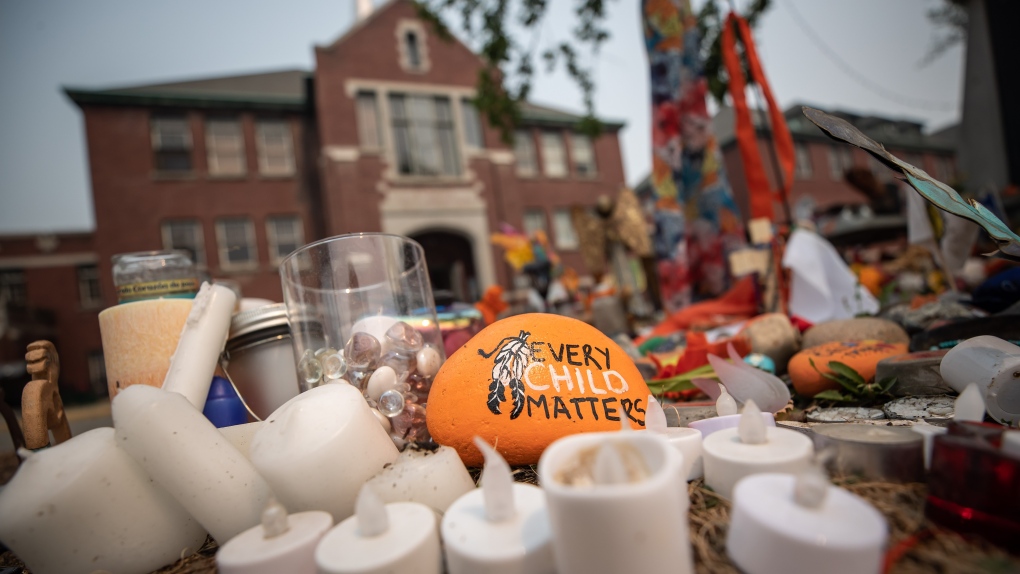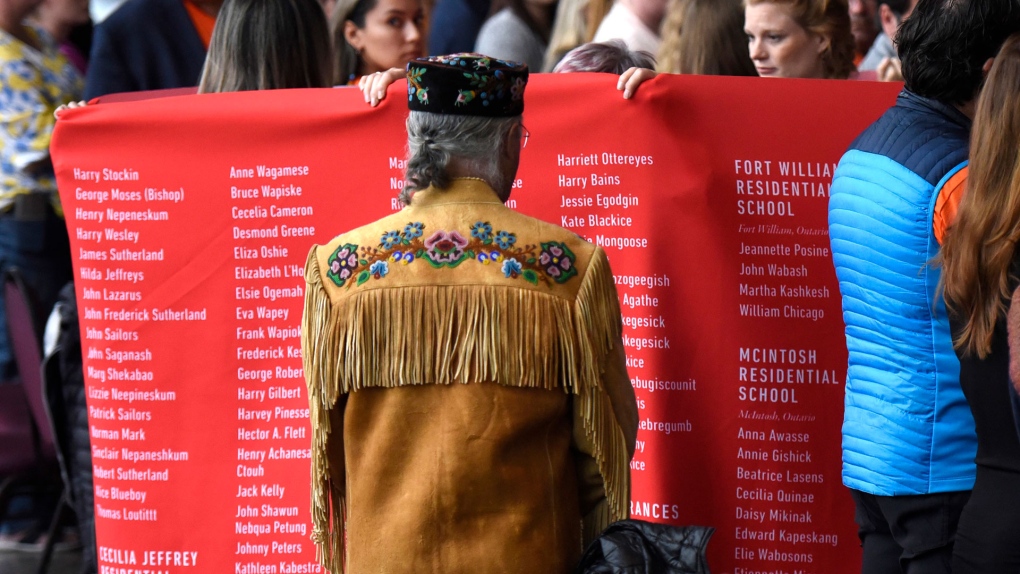Ontario still not decided on National Day for Truth and Reconciliation with federal holiday now just weeks away
 A rock with the message 'Every Child Matters' painted on it sits at a memorial outside the former Kamloops Indian Residential School, in Kamloops, B.C., on Thursday, July 15, 2021. (Darryl Dyck / THE CANADIAN PRESS)
A rock with the message 'Every Child Matters' painted on it sits at a memorial outside the former Kamloops Indian Residential School, in Kamloops, B.C., on Thursday, July 15, 2021. (Darryl Dyck / THE CANADIAN PRESS)
The Ontario government says it still has not decided how to commemorate the federally recognized National Day for Truth and Reconciliation on Sept. 30, and whether or not it will mark the day as an official provincial statutory holiday.
The federal government established the new statutory holiday in July to commemorate the tragic legacy of residential schools in Canada. The decision responds to the 80th call to action in the Truth and Reconciliation Commission report.
With only a few weeks left, some provinces across the country, including Ontario, are scrambling to figure out how to mark the day, and if it will be considered a provincial statutory holiday.
At this point, the government has not said whether provincial employees will have the day off or if schools and some businesses will be closed. The Toronto District School Board says it plans to remain open, and has not received any other direction.
Grand Council Chief Reg Niganobe of the Anishinabek Nation, an advocacy organization for 39 member First Nations across Ontario, told CTV News Toronto on Thursday that the province must recognize the statutory holiday and hold commemorative ceremonies with Indigenous peoples and residential school survivors.
While the government has not reached out to his organization, he said he’s heard from other members of the Indigenous community that the province is working on a ceremony at the site of a former residential school in Sault Ste. Marie, but there’s been no conversations about a provincial statutory holiday.
“They're just talking about it as an event at this point,” Niganobe said. “It's a little disappointing. It's sad but it’s also not surprising for First Nations only because we've barely been consulted on a lot of different things.”
“I think the day should be acknowledged, observed, and events should be taking place at that time. People should be given the time off as a holiday, so they can attend these events.”
In 2015, The Truth and Reconciliation Commission called upon the federal government to establish the statutory holiday to “honour survivors, their families, and communities, and ensure that public commemoration of the history and legacy of residential schools remains a vital component of the reconciliation process.”
Last month, the B.C. government formally recognized Sept. 30 as the National Day for Truth and Reconciliation in the province and announced the closure of schools, post-secondary institutions and some health sector workplaces.
Other provinces, including New Brunswick, Alberta and Saskatchewan, have decided they will not make Sept. 30 a provincial statutory holiday, but will observe it in other ways, which drew strong criticism from Indigenous communities.
 Clement Chartier, president of the Metis National Council, watches as a ceremonial cloth with the names of 2,800 children who died in residential schools and were identified in the National Student Memorial Register, is carried to the stage during the Honouring National Day for Truth and Reconciliation ceremony in Gatineau, Quebec on Monday, Sept. 30, 2019. (THE CANADIAN PRESS / Justin Tang)
Clement Chartier, president of the Metis National Council, watches as a ceremonial cloth with the names of 2,800 children who died in residential schools and were identified in the National Student Memorial Register, is carried to the stage during the Honouring National Day for Truth and Reconciliation ceremony in Gatineau, Quebec on Monday, Sept. 30, 2019. (THE CANADIAN PRESS / Justin Tang)
A spokesperson for Ontario’s Ministry of Indigenous Affairs told CTV News Toronto on Thursday that it’s consulting with Indigenous leaders about how to best commemorate the day.
“Ontario is aware that the federal government has designated September 30th as National Day for Truth and Reconciliation for federally regulated employees,” a spokesperson for Indigenous Affairs Minister Greg Rickford said.
“We are working in collaboration with Indigenous partners, survivors and affected families to ensure the respectful commemoration of this day within Ontario.”
The spokesperson could not confirm if the day would be marked as a statutory holiday, but noted “discussions are ongoing.”
Niganobe stressed that allowing people to take time off is important to increase participation and enable people to take part in commemorative events and ceremonies.
“As many people as are available should participate so that there is a greater understanding of residential schools and what took place and what transpired during that time,” he said.
“The issues still continue today. We have child welfare issues right now and a lot of those revolve around removing the Indigenous child from the Indigenous home. It still takes place today. Those same mistakes are repeating themselves all over again.”
Suze Morrison, the NDP critic for Urban Indigenous Issues, told CTV News Toronto on Thursday that the best course of action is for the province to consult and engage with Indigenous communities about how the province should commemorate that day.
“I do think it should be a stat. This is in line with the direct call to action in the TRC report that a day is marked as a statutory holiday,” she said, adding that a tone of remembrance and grief needs to be set by the provincial and federal governments.
“I really hope the day is taken as a day to reflect and educate. I hope that non-Indigenous people in Canada are reading the Truth and Reconciliation Commission's report,” she said.
“[I hope] they're reading the calls to action, they're learning about Canada's genocide and that they're taking that day to reflect on what their personal role to reconciliation is.”
CTVNews.ca Top Stories

Walking pneumonia is surging in Canada. Is it peaking now?
CTVNews.ca spoke with various medical experts to find out the latest situation with the typically mild walking pneumonia in their area and whether parents should be worried.
Minister calls GST holiday, $250 cheques for 18 million Canadians 'a targeted approach'
Women and Gender Equality and Youth Minister Marci Ien is calling the federal government's proposed GST holiday and $250 rebate cheques a 'targeted approach' to address affordability concerns.
'Her shoe got sucked into the escalator': Toronto family warns of potential risk of wearing Crocs
A Toronto family is speaking out after their 10-year-old daughter's Crocs got stuck in an escalator, ripping the entire toe area of the clog off.
Ancient meets modern as a new subway in Greece showcases archeological treasures
Greece's second largest city, Thessaloniki, is getting a brand new subway system that will showcase archeological discoveries made during construction that held up the project for decades.
Quebec man, 81, gets prison sentence after admitting to killing wife with Alzheimer's disease
An 81-year-old Quebec man has been sentenced to prison after admitting to killing his wife with Alzheimer's disease.
Canada Post quarterly loss tops $300M as strike hits second week -- and rivals step in
Canada Post saw hundreds of millions of dollars drain out of its coffers last quarter, due largely to its dwindling share of the parcels market, while an ongoing strike continues to batter its bottom line.
'Immoral depravity': Two men convicted in case of frozen migrant family in Manitoba
A jury has found two men guilty on human smuggling charges in a case where a family from India froze to death in Manitoba while trying to walk across the Canada-U.S. border.
Prime Minister Trudeau attends Taylor Swift's Eras Tour in Toronto with family
Prime Minister Justin Trudeau is a Swiftie. His office confirmed to CTV News Toronto that he and members of his family are attending the penultimate show of Taylor Swift's 'The Eras Tour' in Toronto on Friday evening.
Trump supporters review-bomb B.C. floral shop by accident
A small business owner from B.C.'s Fraser Valley is speaking out after being review-bombed by confused supporters of U.S. president-elect Donald Trump this week.


































